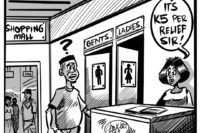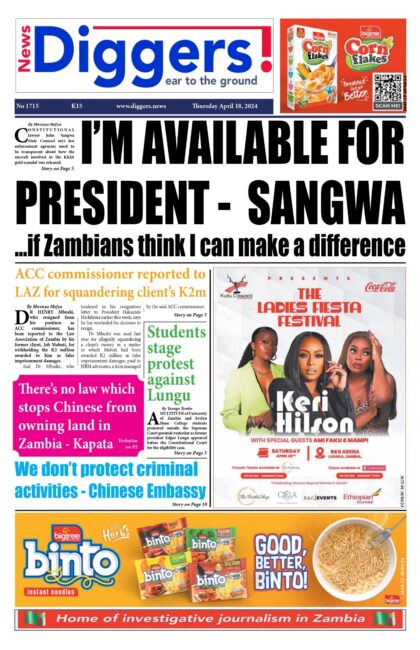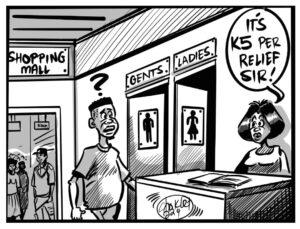In this audio, Minister of National Planning and Development Lucky Mulusa says people must not be arrogant when they are in power because they will not be there forever.
And Mulusa said the PF must not discriminate members of the opposition when giving marketeers the presidential empowerment funds, saying they would also be discriminated against in future when there is a change of power.
Meanwhile, Mulusa today refused to answer questions on how he will handle the pressure being exerted on him to resign after remarking that the recently procured fire tenders look like wheelbarrows.
Speaking when he featured on UNZA Radio’s Lusaka Star program, Mulusa said people must not suffer from arrogance of incumbency.
“We all need to hold our hands together especially those of us in government. We need to migrate from suffering from arrogance of incumbency. We are not here forever. We have been given a privilege to rule for five years, after five years the Zambians will make a decision either way,” Mulusa said.
He said it was important for politicians to remember that voters had the power on Election Day.
“Elections provide the people with that necessary power to participate in the governance of their nation. And for us who have been given that mandate for five years, we must not be blind to the fact that we are only there for five years and after five years the people will hold us accountable. That day, they will have the power which will be in the pen and in that booth. We must always be mindful of that particular day. We must make sure that we work so well that people will give us another mandate to continue with development programs.”
Mulusa said arrogance of incumbency was very dangerous.
“It is very important that when you promise people to do something, finish it. Don’t create situations that disrupts that program because it is very costly. When new people come in, they come in with their own ideas, there is a learning curve, it takes them time to settle, very very costly to the general public. It is cheaper when there is continuality. So we need to make sure that we respect the mandate of the people and we constantly revisit the promises that we are giving the people and we do not suffer from arrogance of incumbency because arrogance of incumbency is very very dangerous,” he said.
Take a listen:
And Mulusa stopped a caller called Elvis from asking him about the fire tenders saying he was on the programme to discuss development.
“First of all Mr Mulusa, honorable, we heard some days before that you uttered some statement in the media…” Elvis said but Mulusa interrupted him, “Listen, if you don’t want to talk about development please save your airtime, I am not taking that question. We are talking development here.”
Meanwhile, Mulusa said the PF must not discriminate the opposition when allocating the marketeers’ empowerment funds because they will also be discriminated when there is a change of power.
He was responding to a question from one of the callers who complained that the money being distributed under the Presidential Empowerment Fund was only going to ruling party supporters.
“Discrimination in markets, I would like to engage Mr Chanda Kabwe and find out the criteria being used in terms of our members. We have decided to govern ourselves as a multi party nation and our Constitution gives everybody the right to association. It would not be good that we discriminate those that are not in government. One day someone else will be in government and he will discriminate us. I don’t think it is a good practice especially in a Christian nation,” Mulusa said.
He also said that government’s decision to engage the International Monetary Fund was an investment in perception because the country would be viewed as having less credit risks.
“This economy was right at the bottom during the period of mid 2015 to mid 2016 which was as a result of the Chinese economy overheating and there was a slow down. They stopped buying our copper, the prices slumped, our mines suspended new projects and we saw massive unemployment from the mines. At that time, we were really in a crisis because our economy was at the bottom. During that time we never devoted on our international obligations, we never. Today, the economy is picking up, our copper production and prices are rising, China is taking more of our copper and ZRA is collecting more money than it collected during that crisis. Why then are we going to the IMF?” Mulusa asked.
“The reason is that we are participants in the international capital and financial markets. Going to the IMF is actually an investment in perception. We would like the global community, international investors to view us as people who do not have the risks of failure to pay. When we do that, our costs of borrowing then goes down. Not that we are going to borrow more but because these bonds we have issued, trade in the secondary market and prices tend to change. When people view you as having less credit risk, your cost of borrowing goes down and that’s why we are engaging the IMF.”
And Mulusa said that PF was open to dialogue and it was the opposition that needed to be encouraged to work with the ruling party.
“It is not us who should be encouraged to work with the opposition, it is the opposition that needs to be encouraged to work together with us. Even when we call for the day for national prayers, why boycott them? If you see that there is something wrong, then go to the national prayers and give a speech that will assist those prayers to have a meaningful disposition that you are looking for. We are open to dialogue and it is the other side that needs to be spoken to.”
Mulusa also observed that Lusaka was undergoing a rebirth.
“Lusaka has people who have settled in places where they should never have settled. In fact in terms of planning, UNZA should never have been here, Kalingalinga, Jesmondine, Chadleigh…should never have been there. The way these settlements are coming up, and lack of a sewer system is actually polluting underground water. So we really need to relieve this pressure on Lusaka, hence the need for us to create another place which can pull people out of Lusaka and allow Lusaka to give itself a rebirth,” said Mulusa.
“There is a rebirth that is going on in Lusaka. If you see the entire road frontage in Kalingalinga along Alick Nkhata, developers are buying off those plots and putting up commercial areas. Eventually, the entire Kalingalinga will actually disappear. That’s a natural rebirth that Lusaka is undergoing but we need a controlled and deliberately planned settlement so let’s wait, we will tell you the results of Cabinet deliberations in terms of whether we are being given the permission to undertake feasibility studies for the new city, whether it will be a capital city, administrative capital city or a commercial centre.”












